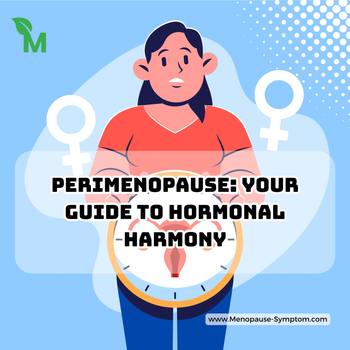1. What is perimenopause ?.
Perimenopause typically occurs in women in their late 30s to early 50s, marking the time leading up to menopause when hormonal fluctuations begin to manifest. It’s important to recognize the signs of perimenopause; symptoms like irregular periods, mood swings, and changes in sleep patterns are common. By recognizing and familiarizing yourself with these changes, you can be better prepared for the journey ahead. It’s important to remember that perimenopause is a natural process, and while it can be uncomfortable, there are many things you can do to make the transition easier.
2. Balance your lifestyle, improve your health and spirit
For example:
• Incorporating a balanced diet rich in phytoestrogens, such as flaxseeds and soy products, can help to reduce some of the hormonal fluctuations that occur during perimenopause.
• Regular exercise not only improves physical health but also improves mood and energy levels, making it an important part of your perimenopause toolkit.
• As you go through perimenopause, consider the importance of open communication with your healthcare provider. Regular check-ups can help monitor your symptoms and prepare you for appropriate solutions to ease your experience.
Many women find that discussing their feelings and experiences with friends or a support group can also be extremely positive during this time. These conversations can help you clarify your own issues during perimenopause, and you will realize that you are not alone in this journey.
Furthermore, educating yourself about perimenopause can empower you to make informed decisions about your health. There are many resources available—such as books, online forums, and seminars—that can provide valuable insights into how to effectively manage your symptoms. Understanding the emotional and physical aspects of perimenopause can help you navigate this period with more ease and confidence.
In addition to making lifestyle changes and seeking support, mindfulness practices can play an important role in managing the emotional ups and downs often associated with perimenopause. Techniques such as yoga, meditation, and deep breathing exercises can help reduce stress and promote mental clarity. These practices enhance your physical, mental, and emotional well-being, helping to alleviate some of the uncomfortable symptoms of perimenopause, such as hot flashes and insomnia.
Once you’ve learned different mindfulness techniques, incorporate them into your daily routine to foster a sense of calm and balance during this transition.
Another important aspect of navigating perimenopause is understanding the role of hormonal changes in your body. As estrogen and progesterone levels fluctuate, you may experience a variety of symptoms that can impact your quality of life. It is important to realize that these changes are temporary and part of a natural progression.
Hormone therapy is an option for some women, but it is important to discuss the potential benefits and risks with your healthcare provider. They can help you weigh your options and determine the best option based on your individual health.
Nutrition also plays an important role in managing perimenopause symptoms. Supplementing with foods rich in calcium and vitamin D can support bone health, which is especially important when estrogen levels are low. Additionally, staying hydrated and limiting caffeine and alcohol can help reduce anxiety and improve sleep quality. As you go through perimenopause, consider keeping a food diary to identify any triggers that may be aggravating your symptoms. This proactive approach allows you to make adjustments that can significantly improve your overall health.
3. Self-care
· Also, don’t underestimate the power of self-care during perimenopause. Prioritizing your mental and emotional health is just as important as your physical health. Engage in activities that bring you joy, whether it’s painting, gardening, spending time with loved ones, etc.
· Taking time for yourself is essential to managing the stress that can arise during this transition. By nurturing your passions and interests, you create a positive pathway to help relieve the problems of perimenopause.
· Social connections are also important during this time. Having supportive friends and family can provide a sense of belonging and understanding. Sharing your experiences can foster deeper relationships and reduce feelings of loneliness.
· Consider joining a local or online support group specifically for women going through perimenopause. These communities can provide personal insights, tips, and encouragement as you navigate this time together.
4. As you go through perimenopause, remember that it is a time of growth and self-discovery.
· Accepting the changes in your body and mind can help you gain a deeper understanding of yourself and your needs. By taking proactive steps to manage your health, seek support, and prioritize self-care, you can navigate perimenopause gracefully and with resilience. This time can present challenges, but it also presents opportunities for renewal. Embrace the journey and know that with the right tools and mindset in today’s society, you can navigate perimenopause with ease and confidence.
5. In conclusion :
· Navigating perimenopause is a unique journey that requires good health awareness, support, and self-care.
· By understanding the changes that are happening in your body and finding the right support resources and community, you can make this transition a positive experience.
Remember, you are not alone in this journey. With the right strategies and mindset, you can navigate perimenopause and the menopause that follows. Embrace this new chapter with an open heart and a willingness to learn, and you will emerge stronger and more self-aware than ever before.
Source: Team MPS compiled, analyzed and wrote. Please dont reup without source. Many thanks.

Don't Ignore These Unusual Perimenopause Symptoms
Invalid Date

Perimenopause: Understanding And Embracing Your Changing Body
Invalid Date
Remember, perimenopause is more than just a transition; it is a celebration of the strength and beauty inherent in every woman’s life.

Perimenopause: Your Guide To Hormonal Harmony
Invalid Date
Perimenopause is a natural stage in every woman's life, usually occurring between the ages of 30 to 50. This is the time when the body begins to change, with a decrease in the production of the hormones estrogen and progesterone.
